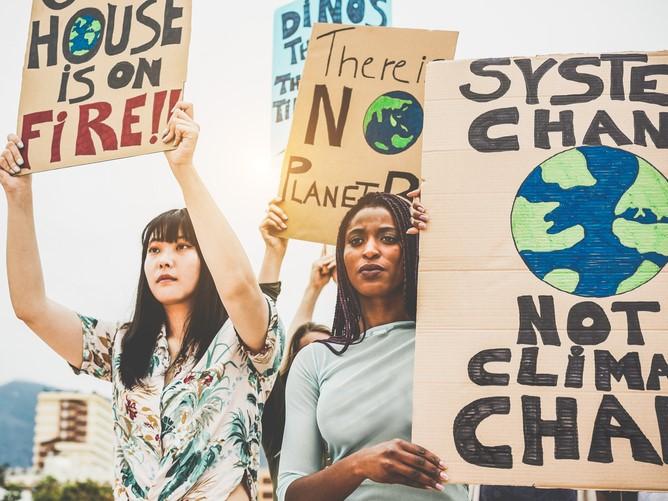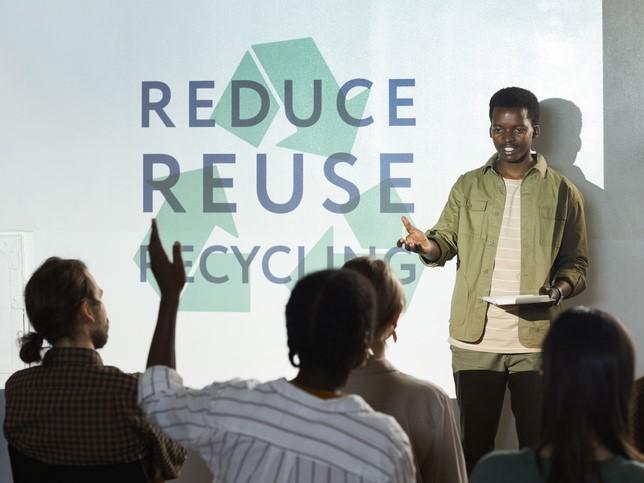There is now no doubt at all that today’s younger generation (and future generations) will face an array of impacts stemming from an increasingly destabilised climate, from heat waves and flooding becoming more frequent and more severe, to supply chain disruptions and food insecurity.
Universities must prepare themselves for these changes and develop action plans to bring their own greenhouse gas emissions to net zero, thus contributing to the mitigation of a higher global temperature and the associated, more severe impacts. How they prepare themselves and what they focus on is key. There is both a significant opportunity and a moral duty for universities to support their students in the face of impending climate-induced adversity.
As highlighted by Students Organising for Sustainability UK’s research in 2021, most students do not currently have access to the educational opportunities that will provide them with the knowledge and skills needed to tackle the climate emergency and adapt to a changing world, both socially and economically.
- Prepare for student sustainability demands to go through the roof
- How to supporting student action on sustainability
- Engaging students in applied research to tackle the SDGs
This omission within personal and professional development will lead to difficulties for graduates in gaining sustainable careers − both within the sustainable development field itself and working for wider businesses as they are mandated to shift in line with a low-carbon reality.
Additionally, without proactively supporting students to develop the knowledge, skills and values needed to respond to the climate emergency on a personal level, the health and well-being of students is expected to suffer further as the impacts of climate change increase.
It is imperative, therefore, that universities provide climate education to all and embed “education for sustainable development” within curricula. Doing so will also reduce the chances that students and graduates will require retraining to be able to contribute further to net-zero futures.
Rather than a one-way line of communication and action, there is an opportunity for students to be engaged and consulted in the creation and delivery of such reforms, and indeed this should be the case for broader institutional sustainability plans. Being open and transparent will pave the way for stronger relations between students, staff and their institutions. It is precisely because climate change will have such alarming impacts that universities will need to empower their students during this transition.
For universities to mitigate their own climate impacts, they will need to rethink how they organise themselves. Whether their efforts are sufficient to reach net zero can only be determined if universities provide transparent and comparable statistics as part of regular emissions reporting.
At present within the UK, only Scottish universities are mandated to report institutional emissions, with an expectation for targets for net zero to be included in 2022 submissions. This lack of a regulatory reporting framework for the sector, specifically on climate action and disclosure of emissions and targets, has restricted progress by HE in this regard.
It puts HE institutions at risk of greenwashing audiences without taking the necessary steps to address the climate emergency or being held to account in doing so. We have already seen the UK’s Financial Conduct Authority mandate climate disclosure for premium listed UK companies in line with recommendations from the Task Force on Climate-Related Financial Disclosures. For HE to keep up and become leaders in the global transition to net zero, we need to see the creation and implementation of a mandatory reporting framework, which includes Scope 3 emissions – indirect emissions resulting from institutions’ activities, such as business travel and employee commuting – as well as target- and strategy-setting requirements.
The Climate Commission for UK Higher and Further Education is working to support a sector-wide approach to the climate emergency, with four senior-level institutional commissioners joined by four student commissioners in directing and leading this work.
As part of this, the student commissioners have published a student statement using input and feedback from student focus groups. The student statement includes nine demands for addressing identified gaps or issues within the UK’s HE sector in tackling the climate emergency. This statement will be sent, along with signatures from supporting students across the UK, to COY16 delegates who will present these views at COP26 in Glasgow next month.
COP26, the UN’s annual global climate summit, is the world’s best – and perhaps last – chance to get runaway climate change under control. To reach net zero and help protect the world’s communities, HE needs to act swiftly − and the UK government must support and mandate this action while also financing the transition.
HE plays a pivotal role in creating countries’ future leaders and others involved across our economies, while also acting as social and economic hubs for local communities. The action that the sector takes will have implications for society collectively. We owe it to the students of now and the future to lead by example.
Manveer Gill is one of four student climate commissioners at the Climate Commission for UK Higher and Further Education. He is also a maths graduate from the University of Warwick and an honorary fellow of the Alliance for Sustainability Leadership in Education (EAUC).
If you would like advice and insight from academics and university staff delivered direct to your inbox each week, sign up for the Campus newsletter.




comment